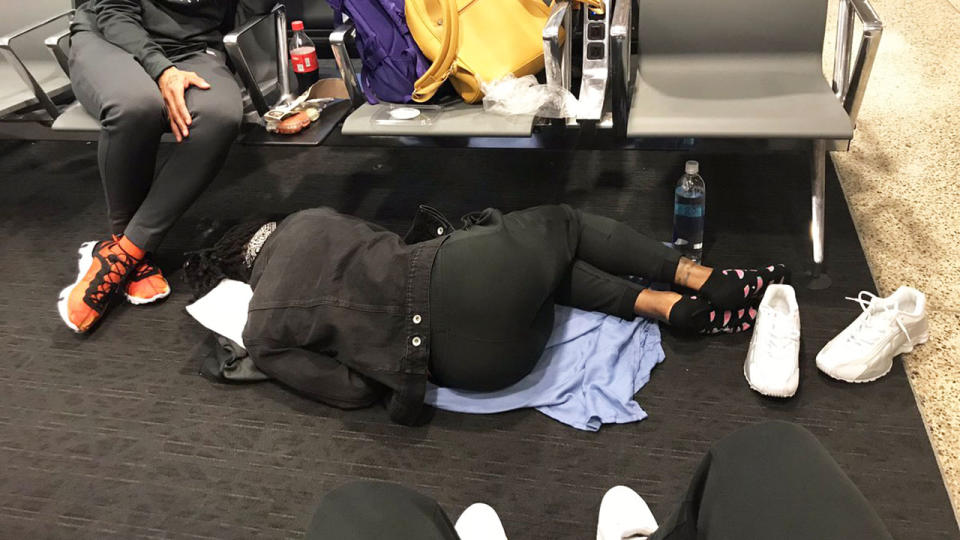'Messed up': Outrage over 'sad' pic of female sporting star
Travel in professional sports can be gruelling with games on back-to-back nights and cross-country flights. That gets even tougher in the WNBA, where teams are prohibited from taking private flights.
Indiana Fever forward Natalie Achonwa documented just that with her team’s circuitous, 22-hour route home in a Twitter thread on Monday afternoon.
The story further underscores how badly the WNBA needs reform — from player pay to travel to more player friendly schedules.
Achonwa’s travel sequence straight out of a nightmare
The Fever wrapped up a 1-2 road trip on Sunday with a narrow loss to the Seattle Storm, and they have a quick turnaround with a home game on Tuesday against the Minnesota Lynx.
In order to make it back on Monday in time to potentially practice, the Fever opted to take a red-eye flight home, although those plans were quickly derailed, as illustrated in Achonwa’s tweets.
game ended in Seattle at 6:30p. We’ve been at the airport since 7:45p. Flight was SUPPOSED to depart at 10:30p (had an hr layover in ATL, then to IND). Delayed till 11:30p. Board the plane, but now we just had to deplane for “mechanical issues”. pic.twitter.com/HeoqkDd28P
— Natalie Achonwa (@NatAchon) June 24, 2019
Despite the late takeoff time, the airport was able to find a new plane for the nearly five-hour flight, although it clearly left the players exhausted.
Here’s the problem though: It’s really hard to find last-minute tickets at a busy airport for large parties. If you’ve ever had a headache trying to re-plan a trip for your family of four, you’ll understand the predicament here for a massive team.

With a flight to Indianapolis out of the picture, the Fever had to turn to the next-best option: a chartered bus. But even that was not without complications — beyond the mandated stops and driver hour limits.
In all, the Fever will need nearly an entire day to travel from Seattle to Indianapolis.
last time I checked, we weren’t a “minor league sports” team. https://t.co/xabJrCpiTE
— Natalie Achonwa (@NatAchon) June 25, 2019
Fortunately the team wasn’t playing one of its back-to-back games, or else it likely would have missed the contest, but it goes to show how changes are needed in the WNBA.
let’s try this again.... boarding a new airplane.
12:50AM: pic.twitter.com/wKdmRpcpae— Natalie Achonwa (@NatAchon) June 24, 2019
WNBA players are asking for better travel conditions
The WNBPA opted out of its current CBA in November and will begin negotiations on a new agreement after the season. Although pay is a big issue across many women’s sports, travel is a major issue for the league as well.
Currently, WNBA players are required by the CBA to fly coach, even if team owners have and are using their own jets. That’s in stark opposition to every major men’s sport, which exclusively use private jets.
WELP, the good news is we got real food for breakfast.
not so good news..... we are now busing 8hrs from ATL to IND. pic.twitter.com/D1LjRcEZsn— Natalie Achonwa (@NatAchon) June 24, 2019
WE LITERALLY CANT MAKE THIS STUFF UP.
pitstop #2. potential bus issues. pic.twitter.com/nbXrwEZgL6— Natalie Achonwa (@NatAchon) June 24, 2019
While that may sound like a first-world problem, it leads to plenty of issues. Last August, the Las Vegas Aces had to forfeit a late-season game because cancelled flights pushed their journey to Washington, D.C. to 25 hours. The league delayed the game by an hour, but after consulting with the WNBPA and doctors, the Aces chose to forfeit while 1.5 games out of the playoffs rather than risk injuries.
Yo I’m sorry you had to go through that. That’s beyond messed up.
— Kapron Lewis-Moore (@KLM_89) June 24, 2019
Los Angeles Sparks head coach and former Los Angeles Lakers legend Derek Fisher took to Instagram to decry the league’s treatment of its players earlier in the month, where he drew the support of several players and journalists.
This extended episode will remain unfortunately common as long as teams have to fly coach. It’s unbecoming of the league to leave their players’ wellbeing up to the whims of the airline industry when better options are on the table.
WITH YAHOO SPORT US/BEN WEINRIB
